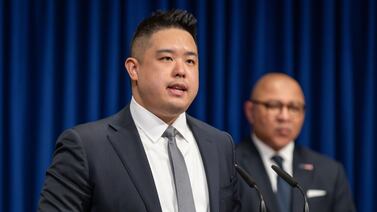Sign up for Chalkbeat Tennessee’s free daily newsletter to keep up with statewide education policy and Memphis-Shelby County Schools.
State lawmakers advanced legislation Tuesday that would put fewer fourth graders at risk of being held back this year under Tennessee’s 2021 reading law.
Similar to changes passed last year to address worries about the state’s tough new retention policies for third graders, the proposal seeks to widen criteria for determining which fourth graders could be held back if they aren’t deemed proficient readers, or aren’t showing adequate growth.
The current policy bases those decisions on the results of state tests this spring in English language arts under the Tennessee Comprehensive Assessment Program, or TCAP. Under the proposal that advanced Tuesday, on a unanimous vote by the House K-12 subcommittee, results from a second locally adopted benchmark test could be considered, too.
And if the student doesn’t show enough improvement under either test, the school’s principal and teacher must meet with the parent or guardian to decide whether the child should be promoted or held back. If advancing, the student must receive academic interventions that could include summer learning programs and tutoring during fifth grade.
The Senate Education Committee is scheduled to take up the bill on Wednesday.
Projections show thousands of students could have to repeat fourth grade this year, even after participating in state-funded tutoring and summer learning programs.
Lawmakers have gotten pushback from families and educators about retention policies that began affecting last year’s third graders and this year’s fourth graders under the 2021 literacy law. Backed by Gov. Bill Lee, that law passed during a weeklong special legislative session to address pandemic-related learning disruptions.
Last year, due to the intervention options and an appeals process that many families used, only about 900 third graders, or 1.2% from that class who took the test, were retained because of low reading scores.
But currently, no such alternatives are available for this year’s struggling fourth-grade readers.
“This bill is going to give us some alternative pathways to get from fourth grade to fifth grade,” said Rep. Gary Hicks, the Rogersville Republican co-sponsoring it with Sen. Dawn White, a Republican from Murfreesboro.
The House’s massive school voucher bill, which advanced Monday with a positive recommendation from the chamber’s Government Operations Committee, includes one public school provision to add several pathways to address the fourth-grade retention quandary. But since the Senate’s voucher bill is strictly about school choice, there’s no guarantee that any public school provisions will remain if both versions pass and legislative negotiators have to reach a compromise.
Rep. Mark White, the Memphis Republican who chairs the House Education Administration Committee and is helping to shepherd the voucher legislation, praised Hicks for offering up an option.
“If the omnibus bill doesn’t make it, we don’t want to be left hanging with the fourth-grade retention issue,” White told Chalkbeat earlier. “It’s just in case the other one falters.”
Gary Lilly, executive director of the state’s superintendent organization, said parents and educators have been hopeful for a “legislative fix” to give more options to fourth-grade families.
“As written, we knew the law would put a lot of students in a bad situation,” Lilly said. “Certainly, a lot of legislators agree that something needs to be done. This way retains academic supports for students, but it still allows them to progress to the next grade, provided there’s agreement that it’s in the best interest of the child.”
You can track the bill on the General Assembly’s website.
Marta Aldrich is a senior correspondent and covers the statehouse for Chalkbeat Tennessee. Contact her at maldrich@chalkbeat.org.








